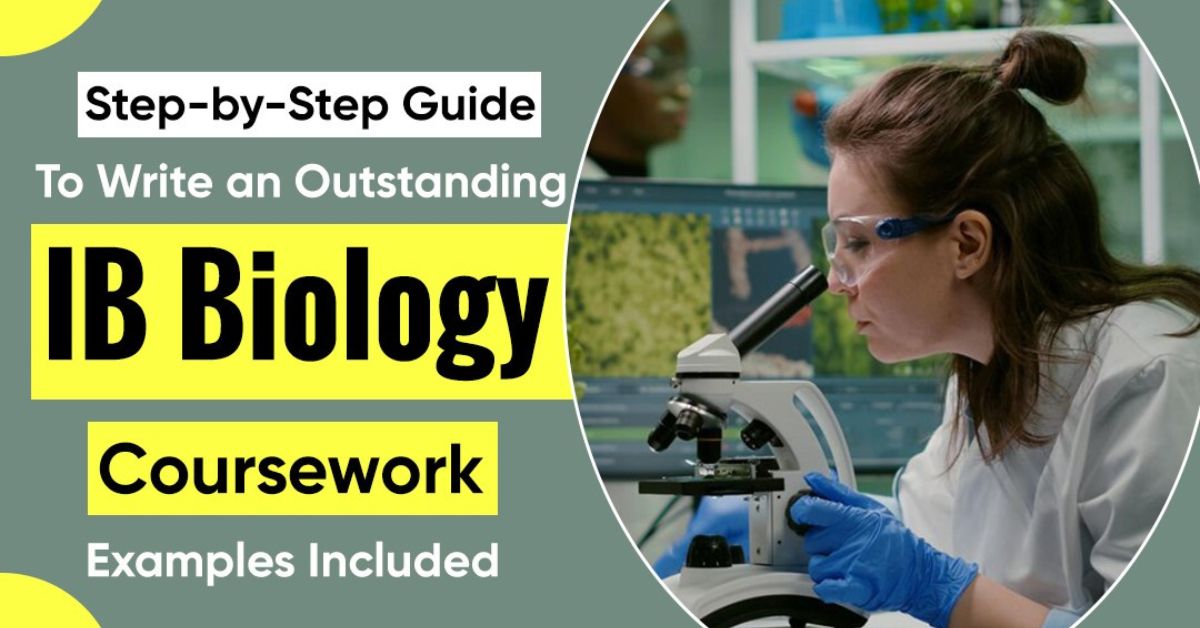Step-by-Step Guide to Write an Outstanding IB Biology Coursework – Examples Included
Feeling lost on how to handle your IB Biology AI? It’s about thinking like a biologist, as the IB Biology IA gives you the opportunity to explore a scientific question that genuinely interests you. So you can apply your knowledge from the classroom to a real-world context. According to the IB Assessment Guide, “IB Biology Internal Assessment (IA) constitutes 20% of the final grade for students enrolled in Standard Level (SL) and Higher Level (HL).”
That means your IA carries real weight, so you need to understand how to develop a research question, interpret results, and match your report to the IB Biology rubric.This detailed guide will help you through the entire IB Biology coursework process, from forming a research question to presenting your results. We’ve included step-by-step advice so you can score the highest.
Let’s dig into the details right away to better understand them!
How to Write a Compelling IB Biology Coursework? A Step-by-Step Guide
Writing your IB Biology IA isn’t just another school assignment; it’s a key component of your final grade that showcases your ability. You need to balance creativity with structure, all while aligning your work with the IB Biology syllabus and assessment criteria.
However, many students find it tough to manage the IA alongside other demanding IB subjects. They feel difficulty with experiments, results, or the structure based on the IB Biology IA rubric. Therefore, they prefer to acquire assistance from British coursework writing services to stay on track and meet the expectations of the IB Biology guide. These services can help refine your research question, structure your investigation and interpret your results.
But if you’re ready to take this on yourself, don’t worry! In this guide, we’ll walk you through the entire step-by-step process so that you can write a high-scoring IA.
1. Understand What the IA Is All About
Before diving into experiments and hypotheses, it’s important to grasp what the IB Biology Internal Assessment (IA) is. Think of it as your personal scientific adventure, a chance to design and carry out an investigation on a biological topic you’re genuinely curious about. This isn’t just busywork. Your IA is a key component of your final assessment and overall IB Biology exam score.
According to the Science Oxygen, your IA should be between 6 and 12 pages long and must include a well-defined research question, detailed method, data collection, in-depth analysis, critical evaluation, and a thoughtful conclusion. It’s about showing that you understand the IB Biology syllabus and can apply it like a real scientist.
2. Choose a Focused Research Question
Choosing a research question might sound simple, but this step is more important than it seems. Since you’ll be spending a lot of time working with this topic, it should be something you’re genuinely interested in. A strong research question is specific, measurable, and tightly connected to a concept in the IB Biology coursework.
For this reason, avoid overly broad questions like “What affects plant growth?” Instead, ask something more focused, like:
- How does temperature affect the rate of photosynthesis in Elodea canadensis?
- What is the effect of caffeine concentration on the heart rate of Daphnia magna?
- How do different wavelengths of light influence the growth of Zea mays (corn)?
Moreover, the question should be testable with the tools you have access to. If it’s too ambitious or vague, you’ll struggle to gather reliable data. Keep it clear, manageable, and biologically relevant.
3. Design a Feasible Experiment
Once your research question is set, it’s time to map out how you’ll explore it. Your experiment doesn’t have to be groundbreaking, as it just needs to be well-planned and achievable. Use simple tools, school lab equipment, or even basic materials at home, as long as they allow you to collect accurate data.
Start by identifying your variables:
- Independent Variable: what you change
- Dependent Variable: what you measure
- Controlled Variables: what you keep constant
Next, write a detailed method so that someone else could replicate it exactly. Be sure to follow ethical and safety standards outlined in the IB Biology guide. Planning is everything here. If your experiment isn’t realistic or safe, your entire IA could fall apart. For this reason, discuss your plan with your teacher before you begin. They can help you fine-tune the setup and avoid common pitfalls.
4. Collect and Record Data Carefully
Now comes the hands-on part: conducting your experiment. This is where attention to detail really pays off. Your raw data should be neat, clearly labelled, and include all necessary units. According to the IB Biology IA structure, well-recorded data is the foundation for high-quality analysis.
Since you aim for accuracy, repeat your trials and record every value precisely. Use reliable tools and make sure to note the uncertainty or error margin for each measurement. This shows you understand both the strengths and limitations of your data. Moreover, if you keep everything well-organised from the start, writing the later sections becomes much easier.
5. Process the Data Thoughtfully
With your raw data in hand, it’s time to process it. This is where you bring in calculations, graphs, and statistics to show patterns or trends in your results. You’re not just crunching numbers, so you’re telling a story backed by evidence.
Include statistical measures like mean, standard deviation, and even error bars if they apply. Choose graphs that visually represent your findings and help make complex data more understandable. Line graphs, bar charts, and scatter plots are all fair games—just make sure they’re clearly labelled and relevant.
More importantly, go beyond just reporting the data. Interpret it. Explain what the numbers mean in the context of your IB Biology coursework. What biological processes are involved? Why did a certain pattern occur? For this reason, your analysis should connect directly to your research question and hypothesis.
6. Analyse Strengths and Weaknesses
Many students lose easy points here by being vague or too generic. Don’t just say “there were limitations.” Be specific. For example, did your measuring tools lack precision? Was there a human error in timing reactions? Acknowledge these issues and explain how they affected your results.
Use the IB Biology coursework rubric to guide this section. Assess the validity and reliability, then suggest detailed, realistic improvements. Instead of saying “do more trials,” say something like “increasing the number of trials from three to five would reduce the impact of random error and improve result accuracy.”
7. Write a Well-Structured Report
A great investigation can still fall short if the write-up is messy or disorganised. The good news? The IB Biology coursework structure gives you a clear roadmap. Stick to the format, and you’ll make life easier for both yourself and the examiner. According to Science Oxygen, here’s a breakdown of the report:
- Title
- Research Question
- Introduction
- Hypothesis
- Variables
- Methodology
- Raw Data
- Processed Data
- Analysis
- Evaluation
- Conclusion
8. Proofread and Check the Rubric
You’re almost done, but don’t skip this step. Proofreading is about more than catching typos. It’s your chance to make sure every part of your IA meets the expectations set out in the IB Biology rubric.
Ask yourself:
- Did I directly answer the research question?
- Are my graphs and tables correctly labelled and referenced?
- Is my conclusion supported by the data?
- Have I addressed limitations and improvements clearly?
Since your IA is worth a significant portion of your grade, take the time to polish it. Check formatting, grammar, and clarity. Better yet, ask a friend or teacher to read through it; they might catch something you missed. Moreover, a clean, well-organised report reflects your effort and boosts your credibility.
Is It Hard to Get a 7 in IB Biology?
Let’s be honest! Yes, getting a 7 in IB Biology is challenging, but it’s absolutely doable with the right strategy. It requires consistency, understanding the IB Biology syllabus thoroughly, and mastering the IB Biology exam format.
Many students find the IA to be a great opportunity to secure a chunk of those top marks. Since it counts for 20%, doing a stellar job on your IB Biology coursework can give you a significant advantage. Also, learn how to think critically; examiners love it when students go beyond memorisation and show they understand biological concepts deeply.
Is Biology Hard in IB?
Biology is one of the more content-heavy IB sciences, no sugar-coating that. You’ll need to learn a wide range of topics, from molecular biology to ecology and evolution. What makes IB Biology tricky isn’t just the content, but also the depth of understanding expected.
However, if you enjoy learning how living systems work and don’t mind a bit of memorisation paired with application, then you’ll probably enjoy the challenge. The labs and IA also make it more interactive than just textbook study.
What Are the Key Concepts of IB Biology?
The IB Biology coursework revolves around a few big ideas. Understanding these can help you make sense of the details and also improve your coursework:
- Structure and Function: The way something is built affects how it works (e.g., enzymes, organs).
- Universality and Diversity: All living things share similarities, yet show diversity.
- Equilibrium and Control: Homeostasis and regulation are key to life.
- Evolution: Populations evolve, and evolution explains biological diversity.
- Continuity and Change: Genetic inheritance and environmental change drive biological processes.
Is IB as Hard as AP?
IB vs. AP is an eternal debate; they differ in approach. AP Biology focuses more on factual recall and exam performance, while IB Biology pushes you to apply concepts, analyse data, and complete an Internal Assessment (IA).
Many students find IB Biology more demanding due to the coursework requirements such as theory, practical knowledge and exams. So, they feel devastated when they have to juggle multiple IB responsibilities. To tackle this, students can contact coursework writing company in the UK. These experts help students through the most challenging aspects of their IB Biology coursework. By getting tailored support, they can manage time better, all without compromising their academic integrity.
Final Thoughts
Does writing your IB Biology coursework involve a lot of work? Yes, but is it worth it? As it’s your opportunity to step into the shoes of a real scientist. It’s where classroom theory meets real-world application, allowing you to explore a topic you genuinely care about. Whether you’re testing the effect of light on photosynthesis or investigating enzyme activity, you’re not just ticking boxes. You’re building skills in research, analysis, and scientific thinking that will stay with you well beyond the IB.
With the right guidance, some careful planning, and a bit of passion, you can produce something you’re genuinely proud of. Just remember: the best investigations start with curiosity. So here’s your next step: pick a research question that truly sparks your interest, review the IB Biology IA structure, and start sketching out your experiment. This is your chance to create meaningful, high-impact work. Go for it!
Author Bio
Avery Blackwood is a professional coursework writer with over 5 years of experience in crafting high-quality IB Biology Internal Assessments (IAS). He creates detailed, well-researched IAS that align perfectly with the IB Biology syllabus and IB Biology rubric. With a keen eye for data analysis, experimental design, and academic writing, Avery ensures that each IA reflects the highest standards of scientific inquiry.







